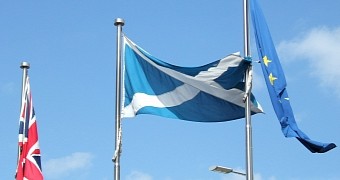Scotland is having a vote over its independence today as it seeks to break apart from the United Kingdom, saying that it could be better off without being tied down to the 300-year old Union.
The Scottish government is banking on the fact that the North Sea has important oil and gas reserves, which would help the country financially for a very long time. An estimated £1 billion ($1.63 billion / 1.26 billion) per year would come from tax takes on the exploitation of the area.
All its riches would help the country be one of the top 20 wealthiest nations in the world, the government believes, although this statement is controversial.
Without the UK, the Scots would lose the pound as their national currency since the British parliament doesn’t want to allow them to continue using it. Using Euro is out of the question for a number of reasons, too.
For starters, Scotland needs to be in the European Union before joining the Eurozone. This alone requires at least a few years, even though the Scottish government vows to start negotiations as soon as possible. The country’s economic, justice and political systems would be heavily scrutinized before Scotland is allowed to enter the European Union.
Secondly, Scotland needs to have a stable currency, as well as to respect a number of requirements before being allowed to enter the Eurozone, which is another process that takes several years to accomplish.
Scotland is also in danger of losing most of its banking system because international banks have already said that in case the country votes for its independence, they’d need to withdraw. It remains to be seen, however, if the big bank run will actually happen.
The Bank of England has promised to play the role of authority for financial stability even if the independence vote passes, but this is a short-term solution and Scotland would need to build its own central bank.
The domino effect
Scotland separating from the UK could mean trouble for Europe too. The entire continent is a powder keg so Scotland’s independence could trigger similar moves in other areas as well.
We’ve already seen what happened in Ukraine, but the problems go beyond this area. Catalonia wants to fracture from Spain, Sardinia wants to part from Italy, while the Basque want to break away from France. The list goes on and you’ll notice secession movements all across Europe, mostly powered not by the people’s desire, but rather by political parties that may or may not properly represent the people.
While not all nations in Europe are part of the European Union, there’s a sense that the entire politico-economic union of the 28 member states has failed to make citizens feel that they’re part of something more and that state limits aren’t all that meaningful anymore.

 14 DAY TRIAL //
14 DAY TRIAL //